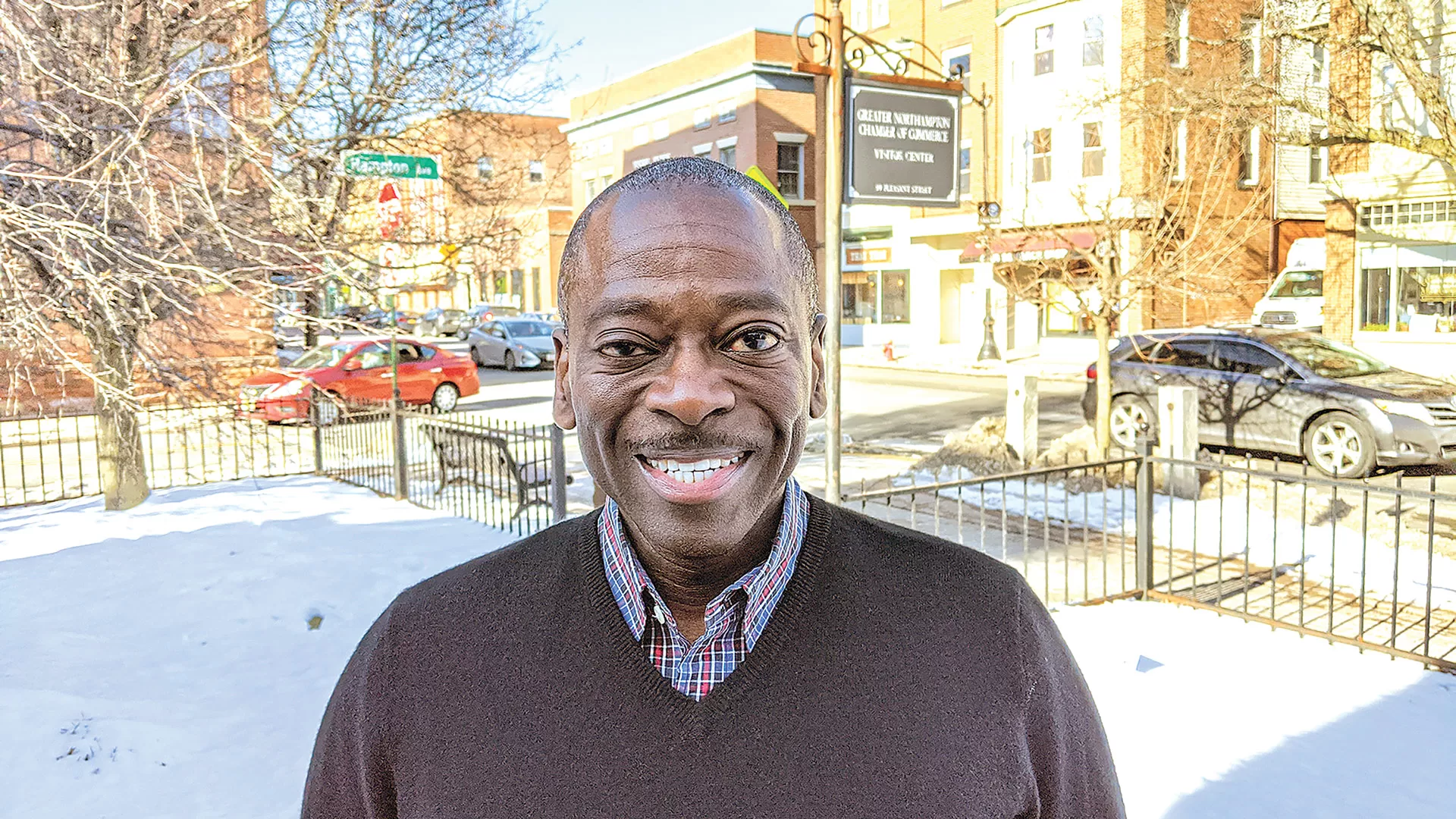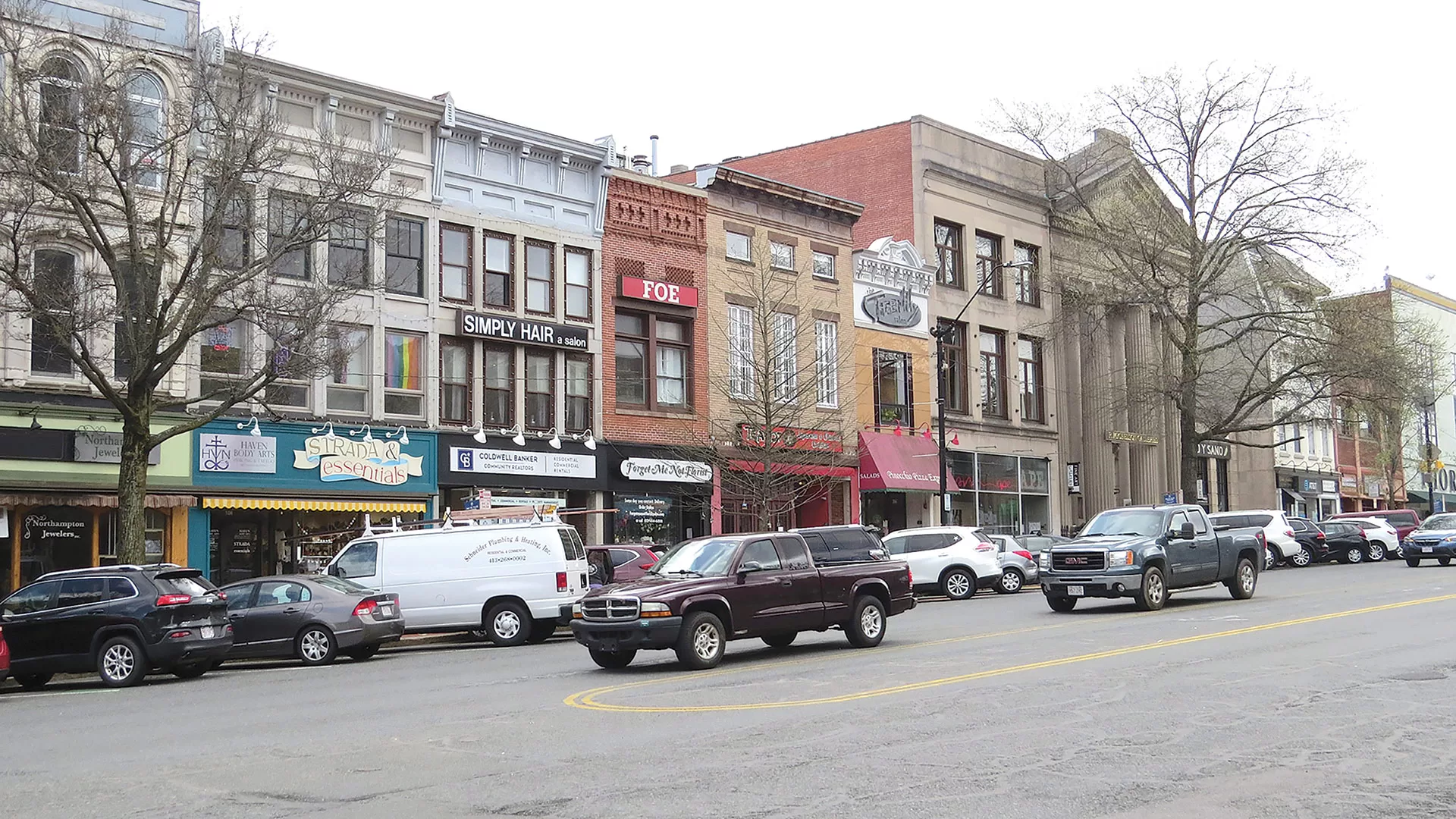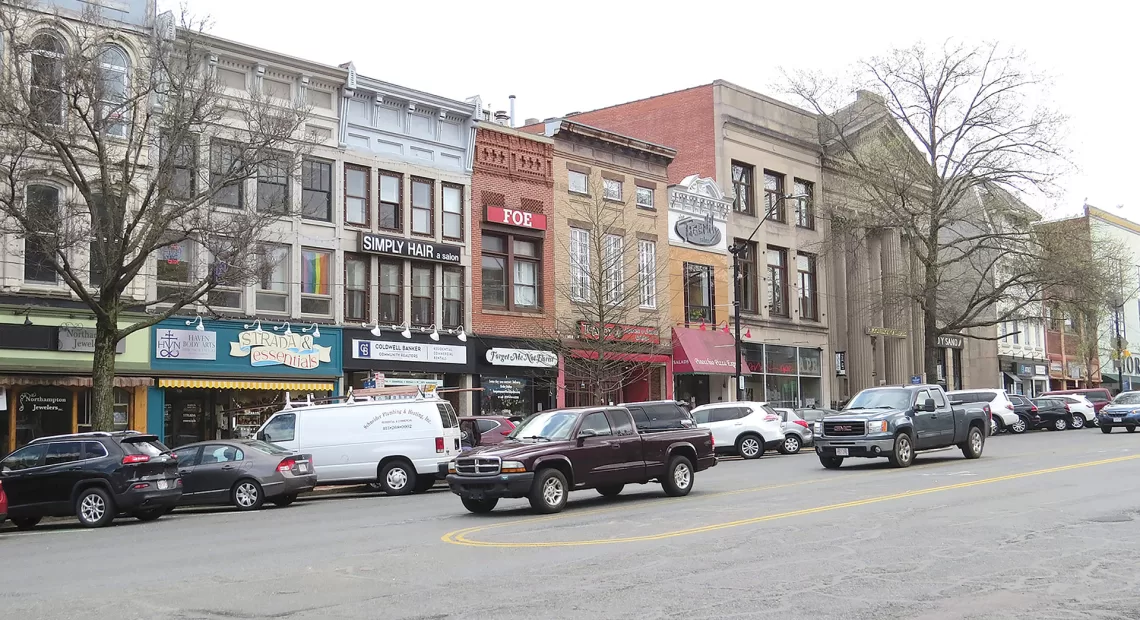Community Spotlight

Vince Jackson says Northampton retailers have mixed reports on the state of business these days, but are mostly optimistic.
As executive director of the Northampton Chamber of Commerce, Vince Jackson spends a lot of time talking to business owners, and what he hears is generally optimistic — to a point.
“Businesses are careful about using the term ‘fully recovered.’ For some retailers, their situation is better than it was in 2019,” he said, referring to the last pre-pandemic year. “Others say, ‘I’m open only three days a week versus seven, but I’m making more money now.’ Then, for others, things are still tough because we don’t have as much daytime foot traffic with a lot of people working from home. So it’s a mix of anecdotes around town, but the overall sentiment is that things are good.”
At the chamber, one way to gauge activity downtown is through Northampton’s gift-card program, which supports local businesses and, for the third straight year, got significant financial support from Keiter. Over this past holiday season, gift-card sales were up 9% from the previous year, and spending by people redeeming those cards has been up 12%.
“People are spending, and that translates into how retailers are doing,” Jackson went on. “I will say, however, that some retailers say things are not as strong as last year, when people were anxious to get back out and do more traditional shopping.
“So you’re going to get varied comments, but the overall sentiment is that business is good. Businesses are still dealing with supply-chain issues and inflationary issues, driving up costs of goods, but overall, people appreciate having made it through the pandemic and are ready to move on with a whole new start.”
Dee Dice, owner of Constant Growth, a marketing and consulting firm that works with many small businesses in the city and region, said there are supports in place in Northampton to help companies succeed, and new ones developing all the time, like the Sphere, a project of the Downtown Northampton Assoc. (DNA) that supports women entrepreneurs.
“Business owners and entrepreneurs are scrappy and resilient; they adapt well, and I think we’re moving into an era where we’re collaborating and coming together in different ways, figuring out how to share resources and how to come together as a community to set the next trend.”
“I feel like the city has much to offer, and it’s a really good place to start a business, for sure,” added Dice, who has become involved with the Sphere. “Is it ever the perfect time to start a business? That’s debatable, but Northampton is a good place to do it.
“I think Northampton values small businesses in the way they value artists and musicians,” she added. “They value that kind of rebel spirit, people who look to be different and take a risk. In that way, Northampton is great.”
The DNA recently launched a new series of downtown business owner meetings “to create an environment for businesses to come together and talk about what they face on the ground — what’s working and not working, and how DNA can help,” Executive Director Jillian Duclos said.
“I think there’s a lot of hope and a lot of enthusiasm for the future. I think the pandemic was really hard because it was isolating in a lot of ways, but things are shifting and changing on a daily basis,” she added.
“Business owners and entrepreneurs are scrappy and resilient; they adapt well, and I think we’re moving into an era where we’re collaborating and coming together in different ways, figuring out how to share resources and how to come together as a community to set the next trend. We’ve always been trendsetters here; a lot of communities follow in our footsteps, and now we’re resetting again.”
On the Road Again
And they’re doing so as a major Main Street road redesign looms ever closer, one that many business owners feel is necessary even as they fear the disruption it might cause once the actual construction work begins in 2025.
“Northampton is a city known for its resilience and community spirit. As we embark on the next phase of the Picture Main Street project, our top priority is to ensure that our local businesses not only endure but thrive,” Mayor Gina-Louise Sciarra said in a recent statement. “Together, we will ensure that downtown remains a bustling hub of activity, culture, and business throughout the construction period.”

Both the Northampton Chamber of Commerce and the Downtown Northampton Assoc. are committed to communicating between their members and the city as the Main Street redesign project unfolds.
To that end, city leaders have joined with the chamber and DNA in a campaign around the road project with three goals: continuous communication channels between businesses, residents, and project teams; marketing, arts and entertainment programming, and educational initiatives to draw visitors and locals to Main Street; and innovative strategies to manage access and minimize disruption.
“A lot of business owners on the ground are actually very excited. Thinking ahead to when it’s complete, there’s not a lot of opposition,” Duclos said. “A lot of the comments have really been about the process of getting there. Because not much has happened, it leaves a lot of room to make up what might happen.
“But City Hall is working really hard,” she added, calling the campaign involving the chamber and DNA a “mitigation committee” that will keep its finger on the pulse of what’s happening and how it will affect businesses downtown.
“We’re going to make sure businesses have a voice at the table and they’re letting us know what they need. And businesses say they need to know the schedule of construction so they can work around that schedule,” she explained, noting that some businesses may not schedule certain events, appointments, or classes when loud construction is happening outside their window — but they’d like to know the schedule well in advance.
“We’ll work hard to create these communication channels to so they can operate their businesses in ways that make sense,” Duclos said. “This is not COVID. We’re not closing. We’ll be moving and shaking during construction, and we’ll be doing a lot of unique events.”
Jackson noted that the project’s goals match the acronym SAVE: safety, accessibility, vitality, and environmental sustainability.
“There is a need. There is a propensity for accidents, which have involved a death or two. And the state has said there’s an issue with two lanes on each side of Main Street that are not really marked for two lanes, and wide crosswalks and a number of other issues. And with accessibility, that means for everyone — bikers, people who have disabilities, people with mobility issues.”
In terms of vitality, Jackson is excited about how the redesign can build on some of the energy already being created not just in downtown businesses, but outside them.
“We’ve seen what outdoor dining can do for a community like this and how that has evolved. Even though we’re out of the pandemic, outdoor dining spots in Northampton are still very popular. That’s one of the silver linings to come out of the pandemic — we continue to capitalize on the beauty of the outdoors. That gives vibrancy to the city and gives people a reason to come downtown and shop, eat, and explore.”
Finally, environmental sustainability means not disrupting the environment too much, replacing and planting new trees so Main Street isn’t all about concrete and asphalt.
“You can come any night of the week into Northampton or Florence and get live music or some kind of performance. That’s encouraging, and of course it means not only the music scene will thrive, but people will eat out at more, hang out at bars and restaurants, and go shopping.”
Despite these positive goals, “business owners are nervous, rightfully so, about the disruption,” Jackson said. “What we’ve been told is that construction is expected to begin sometime in the fall of 2025, and the project is expected to take 18 to 24 months. So businesses are concerned.”
That said, the expectation is that the actual construction — both on the surface and with the underground infrastructure — will be tackled in phases, a stretch of road at a time, with the exact schedule communicated in advance. “It won’t be Main Street disrupted for a full mile; it will be broken up.”
Jackson pointed to previous road projects on Pleasant Street, where the chamber is located, and on King Street, that were successful, with plenty of commerce and activity along those well-traveled thoroughfares today.
“So I think, at the end of the day, people are optimistic about the future and realize this is a once-in-a-lifetime opportunity to think holistically about all the things this project represents.”
Continued Momentum
Jackson reiterated that the city, chamber, and DNA are committed to unifying the community and thinking of creative ways to plan events, activities, programs, and general excitement about downtown momentum, giving people reasons to visit even after the road project commences.
“So there’s new opportunity and new performance venues,” he added, citing the return of the Iron Horse Music Hall this May. “You can come any night of the week into Northampton or Florence and get live music or some kind of performance. That’s encouraging, and of course it means not only the music scene will thrive, but people will eat out at more, hang out at bars and restaurants, and go shopping. It’s the kind of city that invites strolling.”
Duclos agreed. “A lot of businesses support artists and have artists up in their shops and doing events. We want to work more closely with everyone on the ground to connect them and use our resources to support what’s already happening.”









